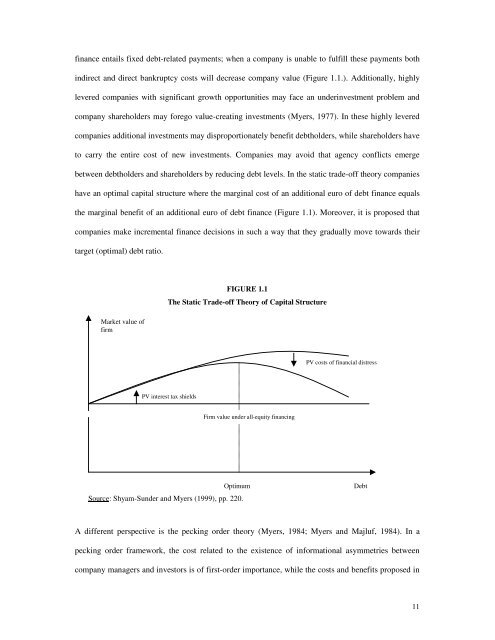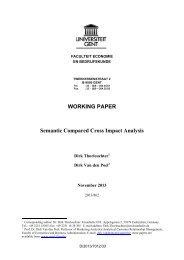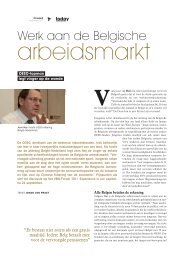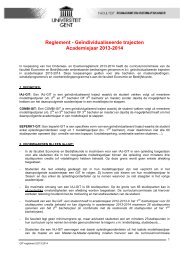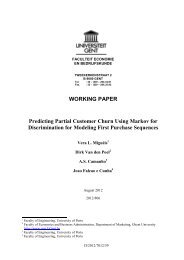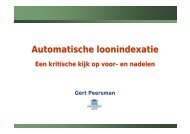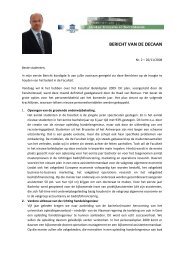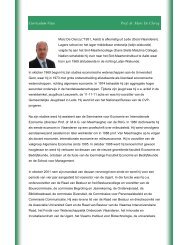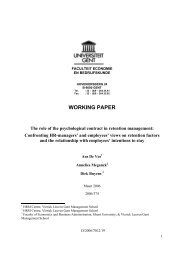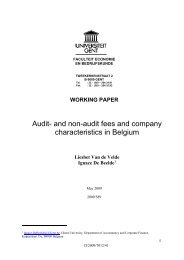- Page 1 and 2: Faculty of Economics and Business A
- Page 3: Financing Unquoted High-Growth Comp
- Page 7 and 8: Acknowledgements This dissertation
- Page 9 and 10: calls. We know everything about eac
- Page 11 and 12: 1.4. Company Growth as a Complex Or
- Page 13 and 14: 3.5.3. Alternative Explanations for
- Page 15 and 16: List of Tables Chapter 1 Table 1.1
- Page 17 and 18: List of Figures Chapter 1 Figure 1.
- Page 19 and 20: De tweede studie gaat na hoe versch
- Page 21 and 22: Executive Summary High-growth compa
- Page 23 and 24: development as a whole. The process
- Page 25 and 26: The rest of this introduction is st
- Page 27 and 28: More significantly, finance scholar
- Page 29 and 30: Furthermore, in light of current fi
- Page 31 and 32: 1.2.1. Amount of Finance A first di
- Page 33: Empirical research confirms that co
- Page 37 and 38: track record, will heavily rely on
- Page 39 and 40: 1.2.4. Dynamics Companies have to m
- Page 41 and 42: focusing on the acquisition of vent
- Page 43 and 44: Moreover, historical finance decisi
- Page 45 and 46: I. TELEOLOGY FIGURE 1.3 Process Mod
- Page 47 and 48: 1.4.1. Growth Indicators, Growth Fo
- Page 49 and 50: TABLE 1.2 Overlap (%) between Diffe
- Page 51 and 52: Study 1: Incremental Finance Decisi
- Page 53 and 54: accessible for a limited number of
- Page 55 and 56: FIGURE 1.4 Early-Stage Entrepreneur
- Page 57 and 58: Overall, a low level of entrepreneu
- Page 59 and 60: timeframe of the study 3 . However,
- Page 61 and 62: are collect through the financial a
- Page 63 and 64: Two drawbacks of the Zephyr databas
- Page 65 and 66: accurately remembering finance even
- Page 67 and 68: experience of venture capital firms
- Page 69 and 70: founding. The increased professiona
- Page 71 and 72: investments internally and not to a
- Page 73 and 74: contribute to the acquisition of ot
- Page 75 and 76: constraints (Himmelberg and Peterse
- Page 77 and 78: 1.9. Structure of the Dissertation
- Page 79 and 80: Chandler G.N. and Hanks S.H. (1998)
- Page 81 and 82: Gregory B.T., Rutherford M.W., Oswa
- Page 83 and 84: Manigart S., De Waele K., Wright M.
- Page 85 and 86:
Van Auken H. (2001) “Financing sm
- Page 87 and 88:
2.1. Abstract This study examines i
- Page 89 and 90:
Companies do not continuously raise
- Page 91 and 92:
future expansion, financial distres
- Page 93 and 94:
Despite contradictory empirical fin
- Page 95 and 96:
lowers company value and in turn in
- Page 97 and 98:
Hypothesis 2: High-growth companies
- Page 99 and 100:
had to be for at least two years am
- Page 101 and 102:
2.4.2. Dependent Variables: Finance
- Page 103 and 104:
Percentage of firms using: TABLE 2.
- Page 105 and 106:
Noteworthy is the high correlation
- Page 107 and 108:
Internal finance: TABLE 2.4 Variabl
- Page 109 and 110:
Internal finance: (EARNINGS/TOTAL A
- Page 111 and 112:
in the probability of raising exter
- Page 113 and 114:
Additional analyses on smaller sub-
- Page 115 and 116:
Our results are important for acade
- Page 117 and 118:
Barclay M.J., Smith Jr., C.W. and M
- Page 119 and 120:
Helwege J. and Liang N. (1996) “I
- Page 121 and 122:
Ou C. and Haynes G.W. (2006) “Acq
- Page 123 and 124:
Chapter 3: Seeking Experienced or L
- Page 125 and 126:
(Rindova, Williamson, Petkova and S
- Page 127 and 128:
higher growth paths both in employm
- Page 129 and 130:
The accumulated experience may not
- Page 131 and 132:
offer finance by venture capital in
- Page 133 and 134:
around three to five years (Zarutsk
- Page 135 and 136:
effects of this potential confound.
- Page 137 and 138:
It is conceptually convenient to de
- Page 139 and 140:
it indicates how the mean initial s
- Page 141 and 142:
The results of the unconditional an
- Page 143 and 144:
significant quadratic trend. In thi
- Page 145 and 146:
exhibit steeper growth curves both
- Page 147 and 148:
obustness of the positive relations
- Page 149 and 150:
employment and intangible assets ra
- Page 151 and 152:
3.6. Discussion and Conclusion Most
- Page 153 and 154:
suggest that venture capital firms
- Page 155 and 156:
Baum J.A.C., Calabrese T. and Silve
- Page 157 and 158:
Hoang H. and Rothaermel F.T. (2005)
- Page 159 and 160:
Peixoto J.L. (1987) “Hierarchical
- Page 161 and 162:
Appendix 1: Robustness Check In the
- Page 163 and 164:
Chapter 4: Early Differences and Pe
- Page 165 and 166:
financial resource mobilization fro
- Page 167 and 168:
processes that make it difficult fo
- Page 169 and 170:
Biotechnology, 2002). The biotechno
- Page 171 and 172:
Table 4.2 differentiates between hi
- Page 173 and 174:
to follow-up interviews, (4) financ
- Page 175 and 176:
informants had difficulties in accu
- Page 177 and 178:
for ventures to replicate the succe
- Page 179 and 180:
A good illustration is the differen
- Page 181 and 182:
corporate investor related to a big
- Page 183 and 184:
In contrast to the image portrayed
- Page 185 and 186:
4.5.2. Initial Differences in Growt
- Page 187 and 188:
TABLE 4.6 Local Search and the Impa
- Page 189 and 190:
investors related to the venture, a
- Page 191 and 192:
persist across time and suggest it
- Page 193 and 194:
performing biotechnology parent com
- Page 195 and 196:
“In our venture capital firm the
- Page 197 and 198:
Additionally, our cases illustrate
- Page 199 and 200:
(Gargiulo, 1993). He approached not
- Page 201 and 202:
that the availability and suitabili
- Page 203 and 204:
and Eisenhardt, 2008). In this cont
- Page 205 and 206:
ventures are often depicted as pass
- Page 207 and 208:
Eisenhardt K.M. (1989b) “Agency t
- Page 209 and 210:
Katila R., Rosenberger J.D. and Eis
- Page 211 and 212:
Sorenson O. and Stuart T.E. (2001)
- Page 213 and 214:
Chapter 5: Limitations, Avenues for
- Page 215 and 216:
and despite these low leverage rati
- Page 217 and 218:
Additionally, early investors may i
- Page 219 and 220:
5.2.1. Entrepreneurs By studying th
- Page 221 and 222:
investment strategy. Given the requ
- Page 223:
Lerner J. (1999) “The government


